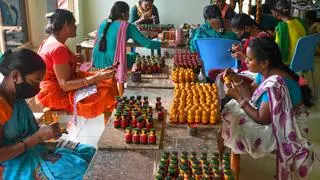Until 2008, the nation followed several policies inimical to inclusive growth. The most glaring among them all were those that encouraged inflow of short-term foreign funds. At a time when the current account situation was comfortable, there was no need to encourage such inflows. Yet it was done in more ways than one, be it through investments allowed in the stock market from countries having zero taxes, or freely allowing foreign currency borrowings even for rupee-designated expenses.
The RBI restricted external commercial borrowings (ECBs) after it realised their impact on money supply.Yet, the Government allowed a few large businesses to bring in billions of dollars each month as ECBs (in fact, ECBs went up after being brought under the restriction). The money supply increased, forcing the RBI to increase its reserves, and with it rose the interest rate.
Transfer of wealth
Effectively, small and retail borrowers were paying additional interest to subsidise the interest savings of the large corporates who brought in ECBs. Several other such policies aided transfer of wealth from the poor to the rich.
Meanwhile, inflation has remained high for long, making life miserable for those below the poverty line. The survival instincts of our political leadership triggered the need to put more money in the hands of the poor, and that too quickly to reverse the perception of the voters. They came out with increased support prices for most crops and the National Rural Employment Guarantee Act (NREGA). Everyone holds the NREGA responsible for shortage of labour in urban and rural areas. The criticism ranges from non-availability of workers to wastage of money, to making Indians lazy and dependent on dole.
A deeper look
A deeper look at what the NREGA has done, however, tells us a different story.
Until the NREGA came into force, wages for low-end jobs in the agricultural and unorganised sectors ranged from Rs 60 to Rs 100 a day and were a little higher for contract workers in the organised sector. But in most cases, they were was below the minimum wages according to the NREG Act. The NREGA has made all this a thing of the past. Wages quickly shot up to well over the minimum wages and are ruling close to Rs 200 a day. Therefore, we must understand that when we hear complaints of shortage, it is a shortage only of cheap labour.
What the several State Governments could not achieve — minimum wages across the country across all sectors — was achieved for a mere Rs 20,000 crore a year through the NREGA.
While the Union Government put around Rs 20,000 crore (much less given the high degree of leakage) in the hands of the poor, the actual amount that accrued to the poor is almost Rs 4 lakh crore (200 million multiplied by Rs 100 multiplied by 200 days) a year, as wages for 200 million people rose by over Rs 100 a day. This is the first time a scheme has put, not government money but the richer peoples’ money, of this order, in the hands of those below the poverty line. A true ‘forced trickle-down’ effect, a right antidote to the several trickle-up effects which we keep creating.
Meanwhile, the situation today is one of stubbornly high inflation, the principal reason for which can be traced to the pricing power of corporates, rather than the sum distributed through NREGA. Several corporates get pricing power through legal protection, non-tariff barriers, BIS certifications, higher-than-necessary export incentives, anti-dumping duties, etc.
Given the brewing crisis, we should expect the politician’s survival instinct to come up with another NREGA-like scheme. Hopefully, they will succeed this time too, in partially reversing wealth transfer to the rich through numerous other processes.
It would be wiser for the industry associations to realise the true cause of inflation, and campaign for voluntary surrender of the morally unjustifiable benefits they enjoy (all of which is moving wealth from the poor to the rich), pay market prices for resources, resist increases in mining concessions, surrender the artificial pricing power they enjoy, and seek more Sam Pitrodas and Nandan Nilekanis to ensure that a technology-backed mechanism of subsidy delivery to the poor is put in place. This is better than seeking a reduction in subsidies to those who are already badly affected by years of high inflation and slow growth of income.
(The author is CMD, Loyal Textiles.)







Comments
Comments have to be in English, and in full sentences. They cannot be abusive or personal. Please abide by our community guidelines for posting your comments.
We have migrated to a new commenting platform. If you are already a registered user of TheHindu Businessline and logged in, you may continue to engage with our articles. If you do not have an account please register and login to post comments. Users can access their older comments by logging into their accounts on Vuukle.